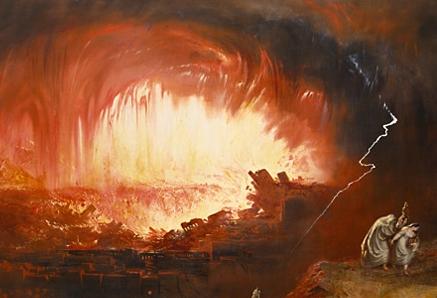Question
Gramps,
I have been wondering for some time about this issue of mine. If free will is so important to God why does he tell the prophets in the Book of Mormon to preach “follow god or be destroyed by him?” I guess if you do not believe in God that threat won’t be of any concern to your free will. What about those people who only chose to do righteous acts because they are scared of being destroyed? Are they still choosing God freely or are they at gun-point so to say?
Karl
Answer
Hello Karl,
Thank you for taking the opportunity to ask a question you have been thinking on for some time now. There appears to be four main points of discussion: 1) Our Moral Agency vs. Free Will, 2) Prophets’ call to repentance, 3) Obedience out of love or out of fear, and 4) Atheism/Different belief systems. In my younger years, I received a blessing that said something to this nature (I don’t remember the exact words), “[Gramps], when you have children you will begin to understand how much God loves you and his children.” When I held my first child, my son, in my arms I began to understand the truth, reality, of this sentiment. I also began to understand that a lot of our gospel principles are best understood when comparing our own family to God’s family. Let’s then begin with the first point, moral agency vs. free will.
Moral Agency vs. Free Will
The gospel principle of moral agency (D&C 101:78) is one of the most important principles we need to know and understand. Free will is not the agency we have received from God. Free will is a sectarian notion implying, “I can do whatever I want without consequence, as long as I am not hurting anyone,” and in light of gospel principles, is false. The truth pertaining to the agency (a gift) we have received from God is that we have the ability to act or to be acted upon (2 Nephi 2:26), or we have the freedom to choose life and liberty through the great mediator of all men or captivity through the devil (2 Nephi 2:27-29). Here are some excellent quotes received from leaders of the Church regarding the moral agency we have received from God:
Elder Boyd K. Packer:
“We are free to obey or to ignore the spirit and the letter of the law. But the agency granted to man is a moral agency (see D&C 101:78). We are not free to break our covenants and escape the consequences.” (in Conference Report, Oct. 1990, 108; or Ensign, Nov. 1990, 84)
Elder D. Todd Christofferson:
“In years past we generally used the term free agency. That is not incorrect. More recently we have taken note that free agency does not appear in the scriptures. They talk of our being “free to choose” and “free to act” for ourselves (2 Nephi 2:27; 10:23; see also Helaman 14:30) and of our obligation to do many things of our own “free will” (D&C 58:27). But the word agency appears either by itself or with the modifier moral: “That every man may act in doctrine and principle … according to the moral agency which I have given unto him, that every man may be accountable for his own sins in the day of judgment” (D&C 101:78). When we use the term moral agency, we are appropriately emphasizing the accountability that is an essential part of the divine gift of agency. We are moral beings and agents unto ourselves, free to choose but also responsible for our choices.”
The gift of agency, as received from our Father in heaven, denotes that we are accountable before God for our earthly decisions, especially decisions which are in direct opposition to God’s will, or sin (both sins of commission and sins of omission).
The Prophets Commandment to Call to Repentance
The principle of repentance, and the exhortation received from prophets, is best understood in connection with the principles of faith, moral agency, and God’s work and glory. The scriptures refer to us as “agents unto ourselves” who have been given the capacity to act (or to be acted upon). “And it is given unto them to know good from evil; wherefore they are agents unto themselves, and I have given unto you another law and commandment.” (Source – Moses 6:56) The knowledge we receive is obtained through personal study, teachers expounding principles of the gospel, through personal experience, and through receiving laws and commandments. When Adam and Eve were in the garden of Eden they received commandments. They had knowledge of these commandments/laws. They were given moral agency to choose for themselves to either obey or to reject the commandments received. What then happens if we choose to reject received commandments?
As with Adam and Eve we will be held accountable by God and we will receive the consequences of our decisions, and whether we enjoy or dislike the consequence of breaking commandments is really irrelevant; although, once we choose to act in ways that are contrary to God’s will we will either humble ourselves and exercise our faith unto repentance, or the Lord may inspire one of His servants to extend the Lord’s arm of mercy (Alma 5:33) via a prophetic call to repentance. Our scriptures are filled with examples of the sons and daughters of God, who had knowledge of said commandments/laws, chose to break those commandments, and then despite God’s efforts they continued to rebel. As they continue to rebel, and the increased of unrepented wickedness, the Lord indeed does provide His children with ultimatums, as any parent has the right to layout.
President Ezra T. Benson in his well known address “Beware of Pride” specified two possible outcomes when we are disobedient: 1) we will either humble ourselves and plead for forgiveness, or 2) We will continue on in wickedness and the Lord will then have need to “compel” His children to exercise humility or be destroyed. A prophetic warning we have received can be found within “The Family: A Proclamation to the World” where a voice of warning is received pertaining to families. President Gordon B. Hinckley in one of his general conference addresses rebuked fathers who abuse spouse and offspring. The real question we should be asking ourselves, “Are we humble enough to accept the voice of the Lord as spoken from the mouth of His holy prophets?” Jacob in the Book of Mormon provided a stern warning and rebuke to husbands and fathers who were desiring polygamy. Why does this matter, why even call anyone to repentance at all, if we have free agency (moral agency)? Why not allow us to live and let live? Why not just love us for who we are?
This question is best understood through understanding God’s work and glory, which is to bring to pass our immortality and eternal life (Moses 1:39). Truth, God loves all of His children for who they “really” are. We are His children, His sons and daughters, with the same spiritual potential. The key word being potential. Our potential inherited glory is dependent upon our personal choices, and God desires all of His children to reach our full measure of our creation. Our Father in Heaven gives us knowledge, chastens us when necessary, so that we may know how to return to Him and receive all that He hath. If we act in righteousness, we have no need to fear any rebuke from God or from His prophets. If we act against God’s will, God will do what is necessary, honoring our agency, to return us back into the fold. One of my favorite scriptures regarding a straight edged rebuke is given by an angel to Alma the Younger who spoke these words, “And now I say unto thee, Alma, go thy way, and seek to destroy the church no more, that their prayers may be answered, and this even if thou wilt of thyself be cast off.” (Mosiah 27:15) In every rebuke, whether by the Lord himself, through one of His angels, or through one of His servants our moral agency remains intact. The angel honored Alma’s agency when exhorting him to seek no more to destroy the Church so that his Father’s and others prayers may be answered.
A prophetic call of repentance is often a last resort to try and help individuals, cities, or nations to return to God. As members we are instructed that we are all missionaries. The implied action of a missionary is the call of repentance. The call may be accomplished through teaching, and when instructed the individual humbles themselves, accepts truth, exercises faith unto repentance, and then is baptized. The vocal call to repentance, as noted in scriptures, doesn’t occur very often and not until much wickedness has entered into the hearts of the children of humankind.
Why do we as parents, as friends, and as family call anyone to repentance? Because we love them. If the call of repentance is not motivated by love, then the call is not from God. This moves us into our next point, obedience from love or fear.
Obedience from Love or Fear
When we think upon our Father in Heaven, in relation to obedience, which option would God prefer? 1) that our obedience is rooted in our love/charity for Him, or 2) that our obedience is rooted in fear of potential consequences? In the New Testament, the Lord provided this wisdom, “If ye love me, keep my commandments.” (John 14:15) The answer to the question proposed should be self-evident. The Lord indeed does desire our obedience to be rooted in love and charity towards Him; however, should we choose to obey out of fear is this always a bad thing? This answer should be self-evident also. Obedience stemming from fear is not always a bad choice. For example, as we contemplate the nature of little children as they are progressing in maturity, knowledge, and understanding, obedience from fear often is a good and beneficial option for the child. When my then three year old would run out into the middle of a street, without looking both ways, they received a consequence accompanied by a warning and if they did so again they would be punished. When the circumstance presented itself again my children then had a choice to either obey out of love, “Dad said not to go into the street. He explained why I shouldn’t go into the street. I am not going into the street.” Or they could obey from fear of the consequence.” I want to go into the street, but I don’t want the consequence Dad said would happen if I did so again. I am not going into the street.” As a father, I would prefer obedience from love and knowledge, but if fear of my consequence kept them safe then it kept them safe and that is a good thing.
Our Father in Heaven would indeed prefer that our obedience stemmed from our love for Him. We have been instructed in matters that pertain to good and evil. We all have given the Spirit of Christ to help us distinguish between good and evil. We have been informed regarding our decisions in life, whether they be good or whether they be evil. We have been instructed receiving knowledge pertaining the our choices and if they are good, we receive the reward of them being good. If they are evil we receive the reward of them being evil. This is highlighted in these verses in the Book of Mormon (Mosiah 16:11-12),
“If they be good, to the resurrection of endless life and happiness; and if they be evil, to the resurrection of endless damnation, being delivered up to the devil, who hath subjected them, which is damnation—
“Having gone according to their own carnal wills and desires; having never called upon the Lord while the arms of mercy were extended towards them; for the arms of mercy were extended towards them, and they would not; they being warned of their iniquities and yet they would not depart from them; and they were commanded to repent and yet they would not repent.”
As members of the Church of Jesus Christ we know that there will be an eternal judgment to come. There is eternal happiness and there is eternal misery — opposition which is affixed. Would it bother me if one of my children kept their covenants out of fear their whole life and in death we remained an eternal unit in the Celestial kingdom? No, I would not be bothered one bit; although, I would have preferred that he loved God rather than feared God. God’s call to repentance is a warning of an event that will occur, an event none of His children will be able to bypass. God’s justice and mercy are real, they are very real, and neither mercy nor justice can rob each other of their due accounting. When God uses His prophets to call His children to repentance, He is providing an opportunity for repentance and a turning of the heart back to truth. If at first by fear they return, so be it. If by love they return, so be it, and in the mind of God we are all “little children” (D&C 50:40) who are progressing in knowledge, maturity, and understanding in learning how to become like our Father in heaven.
Atheism/Differing Belief Systems
The final topic of discussion addressed in your question pertains to other belief systems (you specifically mention Atheism) as stated here, “if you do not believe in God a threat like that won’t be of any concern to your free will.” In the Book of Mormon we are provided this truth, “For behold, the Spirit of Christ is given to every man, that he may know good from evil” (Moroni 7:16) No matter our earthly belief system we all have been given the Spirit of Christ which allows us to know good from evil. A prophetic rebuke, or call to repentance, is for every man or woman who walks the earth. This includes all faiths, all religions, or even the lack of belief (Atheism). A personal belief system doesn’t deny the reality of what is to come. For example, let’s review the second to last paragraph in “The Family: A Proclamation to the World” which states, “WE WARN that individuals who violate covenants of chastity, who abuse spouse or offspring, or who fail to fulfill family responsibilities will one day stand accountable before God. Further, we warn that the disintegration of the family will bring upon individuals, communities, and nations the calamities foretold by ancient and modern prophets.” Our personal belief system will not change the judgments of God which are to come. Our personal belief system will not change what is, what was, and what will be — truth. Our personal belief system will not change the consequences of the disintegration of the family. We have the moral agency to reject light or to receive more light no matter our faith or our beliefs, but we do not have any right to change or to remove the consequences of our decisions.
Gramps







